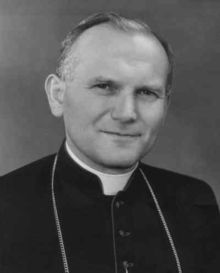During his time as a priest and teacher at the University of Lublin, Karol Wojtyla (1920-2005, later to become Pope John Paul II) developed his own personalism, strongly influenced by, among other sources, phenomenology and Max Scheler. In 1954 he wrote his doctoral dissertation on Scheler.

The fact that Wojtyla developed an ethical personalism was to be of great consequence, as it became fundamental to his work as Pope, thereby also forming the philosophical basis for several decades of the Catholic Church’s influence on the world and on millions of people.
The fundamental question that Wojtyla attempts to answer in his work is: What is a human being? A basic theme for Wojtyla is the unity of the human person. He rejects Descartes’ dichotomy of soul and body: “In fact, body and soul are inseparable: In the person, in the willing agent and in the deliberate act, they stand or fall together.”
It is in intentional acts that the person transcends him- or herself; this theme is of paramount concern to Wojtyla, and with him all personalists. Wojtyla explores the theme in terms of humans coming into being through action and thereby entering an ethical life. This dynamic flourishes under freedom and becomes impossible if the human person is employed as a means by impersonal forces.
Wojtyla is deeply indebted to Scheler, however he does not follow him all the way. He finds that Scheler stresses too much the emotional side of life at the cost of the active, will-governed subject. Wojtyla believes that the intellect precedes the emotions.
Humans are for Wojtyla an integrated whole that includes both soul and body and comes into existence within community and through intentional action. Humans therefore become alienated if they lose their relationship to, and engagement with, others.
In the Spanish-speaking world, Wojtyla’s work has significantly influenced contemporary systematic personalist Juan Manuel Burgos. Based in Madrid, Burgos has developed what he terms a modern ontological personalism in which he rigorously unfolds the primacy of the category person for any and all philosophical thought about being. Burgos, like Wojtyla, seeks to avoid the symptomatic body-mind dualism of modern rationalist philosophy by conceiving of the person as an irreducible triplicity: body, mind, and spirit.
